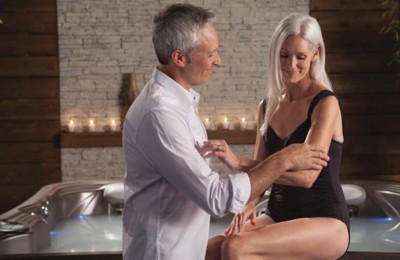Relief from arthritis symptoms

Arthritis is a condition which affects more than 4.6 million Canadian adults—a number that is expected to increase to an estimated 7.5 million by 2036. Despite there being more than 100 different types of arthritis, the Arthritis Foundation in the U.S., found hot tubs to be helpful in alleviating pain associated with several types, including osteoarthritis, RA, and fibromyalgia. The foundation states the soothing warmth and buoyancy of the water in a hot tub or swim spa makes it a safe and ideal environment for relieving arthritis pain and stiffness.
A hot tub can help provide relief for a variety of medical conditions. It starts with the basics of hydrotherapy. When immersed in warm water, the body’s temperature rises, causing blood vessels to dilate, which increases circulation. Once a bather has acclimatized to the water’s temperature, they can add movement, such as a gentle water exercise to limber stiff joints and muscles. The water not only supports joints to encourage free movement, but also acts as resistance to help build muscle strength. Swim spas are beneficial in this case, as they are larger vessels that allow bathers to spread out to get the most out of their aquatic exercises.
Further, jet nozzles release warm water and air, which massages the body and helps to relax tight muscles. Hydrotherapy has also been said to help reduce side effects such as depression and fatigue, which often occur with arthritis.
Soaking before bedtime
Today, everyone works long hours, juggles multiple responsibilities, and is constantly on the go. This begs the question, if everyone is so busy, why do they have trouble sleeping?

It is estimated between 50 and 70 million North Americans chronically suffer from a disorder of sleep and wakefulness, hindering daily functionality and adversely affecting health and longevity. There are approximately 90 distinct sleep disorders; most are marked by one of the following symptoms: excessive daytime sleepiness, difficulty initiating or maintaining sleep; and abnormal events occurring during sleep. The cumulative long-term effects of sleep loss and disorders have been associated with a wide range of health consequences, including an increased risk of hypertension, diabetes, obesity, depression, heart attack, and stroke.
There is nothing better than a good night’s rest; however, many people cannot achieve this naturally and, as a result, turn to sleep aids. However, many doctors suggest alternatives to medicine to remedy this problem, and setting a calming nightly routine is one of them. Part of this routine should be soaking in a hot tub. Hot water therapy triggers the body’s natural sleep mechanics—a 20 minute soak before bed each night can help relieve stress and anxiety, thus making it easier to fall asleep. This routine can actually induce a more restful, deeper sleep. When combined with aromatherapy, stress relief and overall relaxation can be heightened.
People also sleep better and feel more alert during the day if they exercise. A study in the December 2011 journal Mental Health and Physical Activity, which comprised more than 2600 men and women, ages 18 to 85, found that 150 minutes of moderate to vigorous exercise per week provided a 65 per cent improvement in sleep quality. With a swim spa, there are no more excuses for not going to the gym as it is conveniently located in the backyard and be used year-round.






